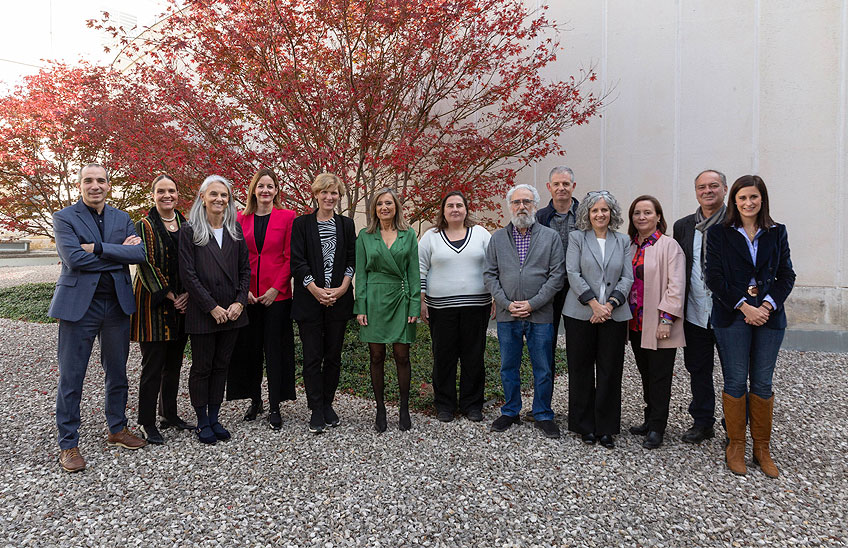María Iraburu, president: "We want to train students with a vocation for service and capable of seeing the social dimension of their profession".
The University has held a workshop to analyze the service-learning methodology and its contribution to society.

FotoManuelCastells/La president, María Iraburu, and the mayoress of Pamplona, Cristina Ibarrola, together with the speakers and some of the participants at the workshop
15 | 11 | 2023
The development of a map of energy poverty in Navarra, nutritional advice to people in status vulnerable or school support to children at risk of exclusion. These are some examples of service-learning projects (ApS), the methodology professor through which the student learns the curricular contents and professional skills of a subject and also provides a service to society in different areas and in partnership with institutions and social entities.
With the degree scroll "Service-learning as an impulse for students' social commitment", this methodology has been the focus of a workshop organized at the University of Navarra, with the participation of the president, María Iraburu, and the Mayoress of Pamplona, Cristina Ibarrola.
María Iraburu emphasized that service-learning incorporates a solidarity-based approach to the core of the University, such as teaching and research. "This has as a consequence the sustainability and permanence of the social commitment of professors and students", she pointed out. The president valued the richness of the relationship between the University and other institutions, which can contribute their experience in solving the problems of society. In this sense, she advocated"training students with a vocation for service and capable of seeing the social dimension of their profession". "These people will transform the world with their work", he added.
The president concluded by suggesting to the teachers present at the workshop, inspiration and creativity: inspiration to promote PSA initiatives by listening to others; and creativity to detect subjects that could give rise to original projects and ideas.
For her part, the mayoress of Pamplona, Cristina Ibarrola, highlighted the "welcome commitment" of the University of Navarra "to offer a comprehensive training for students, which goes beyond the development of the scientific knowledge and has an explicit vocation of service to society, placing solidarity as one of the core values".
Ibarrola has assured that with methodologies such as ApS, the University goes beyond the limits of campus and permeates in many aspects the whole of Pamplona society and has underlined the commitment of the academic center with Pamplona and its adhesion to the local pact for the development of the diary Urban diary 2030. "The role of the institutions that are dedicated to teaching must go beyond the individual talent of their students, who must find in the city the environment in which to integrate their work, where to propose solutions to real problems; and thus contribute to the training of an active, participatory and co-responsible citizenship," he said.
Then, professors Elena Arbués, from the School of Education and Psychology; and Roncesvalles Garayoa, from the School of Pharmacy and Nutrition, explained what the ApS methodology consists of and what it means for the student. "What adds value to us are the civic competencies and skills that are acquired: empathy, the solidarity of knowing people in vulnerable situations, knowing how to communicate and the commitment to work well done", detailed Roncesvalles Garayoa. Cristina Muñoz, Director of Planning and design of the University's campus , described the projects that are being developed in the university environment and that can be applied to service-learning.
The workshop was completed with the interventions of Javier Soto, president of the APS Navarre network , who explained the work of the organization; and José Manuel Santana, pedagogue and technician of the Pamplona City Council, who described some of the learning and service experiences promoted by the consistory. "Educational excellence does not exclude social commitment. It is about learning better to be better, that means service-learning," said Soto. For his part, Santana stressed that community service and practical learning cannot be separated. "It's about directing talent for the benefit of a community," he concluded.
